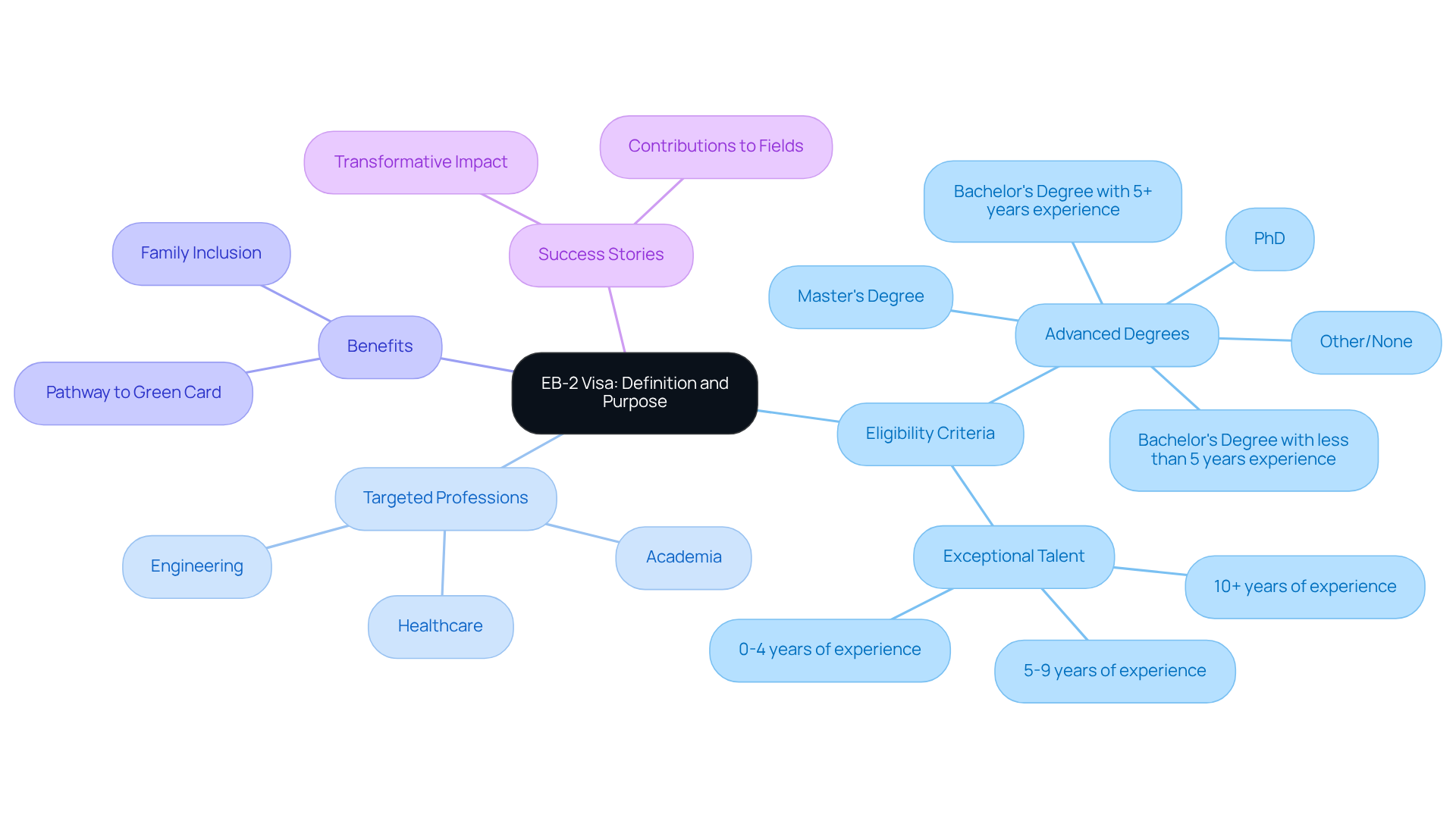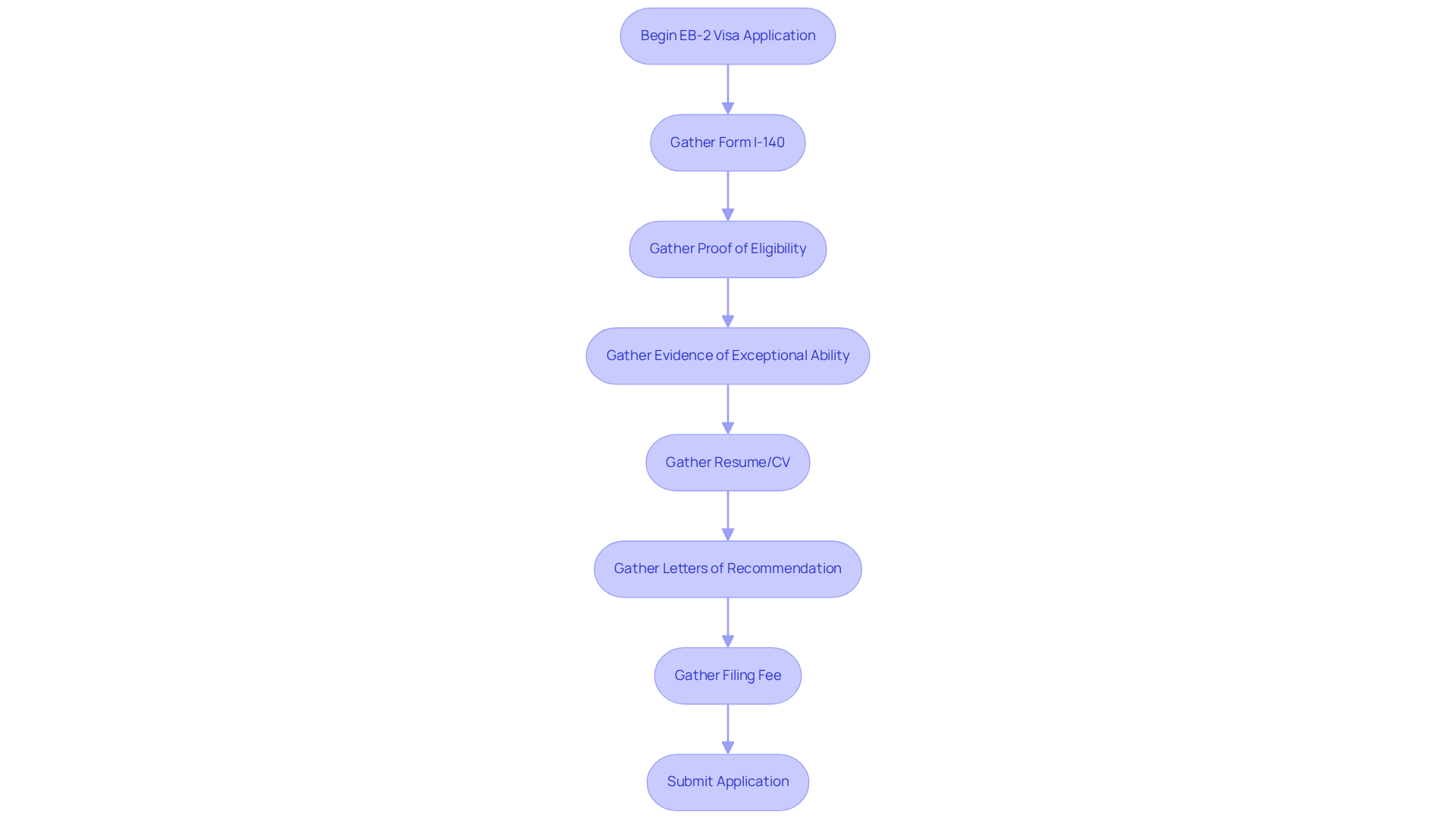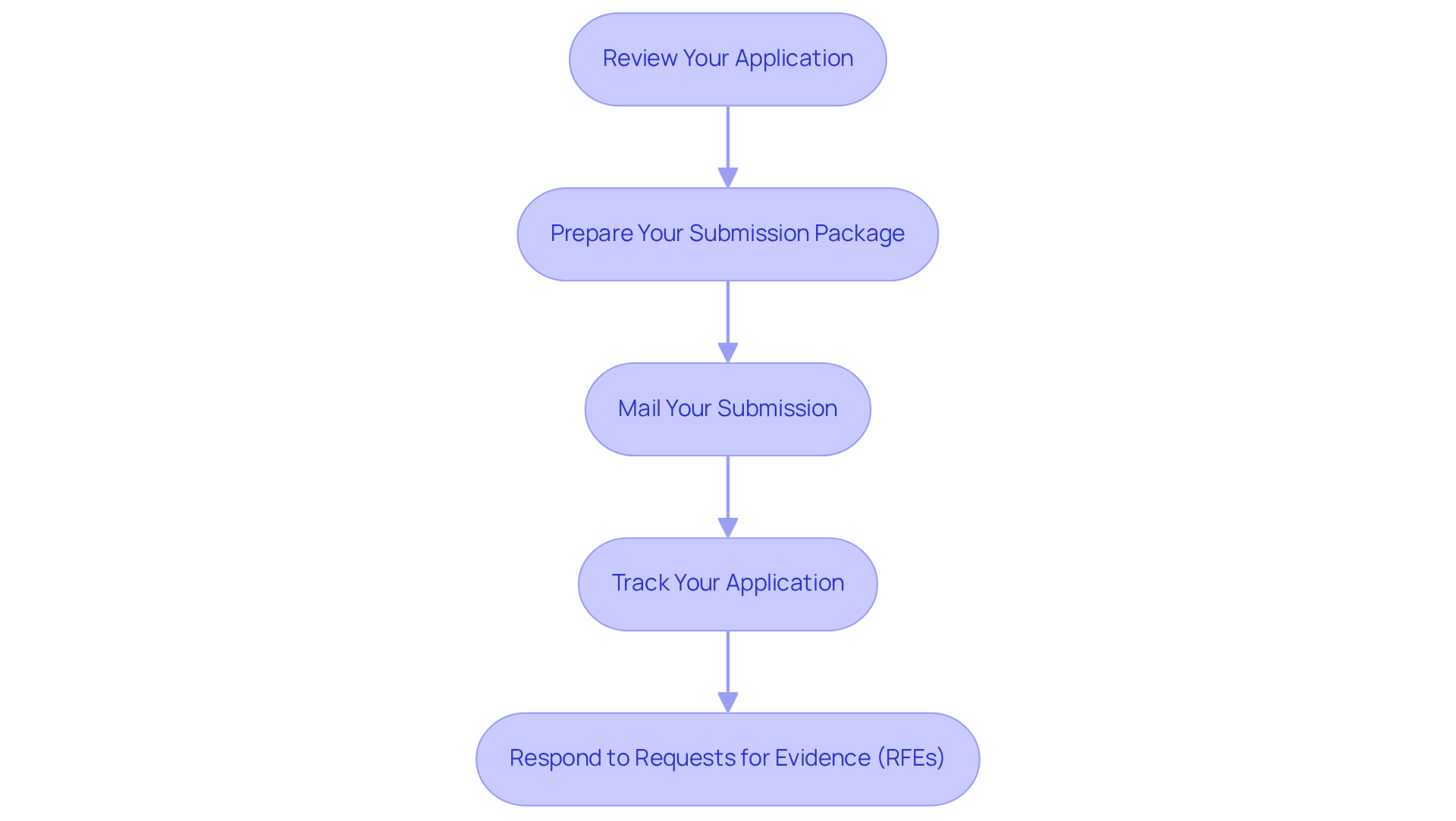Overview
The EB-2 visa process can feel overwhelming. It starts with determining your eligibility through advanced degrees or exceptional ability. You’ll need to gather the necessary documentation and submit a well-prepared application to USCIS. This article outlines these steps in detail, emphasizing the importance of meeting eligibility criteria and providing thorough documentation. Given the recent declines in approval rates for National Interest Waiver petitions, it’s crucial to enhance your chances of approval. Remember, you’re not alone in this fight—we’re here to support you every step of the way.
Introduction
Navigating the complexities of the EB-2 visa process can feel overwhelming. Have you ever felt lost in the immigration maze? With the demand for this immigration pathway on the rise, it’s crucial to understand that the EB-2 visa is designed for foreign nationals with advanced degrees or exceptional abilities. This visa not only opens the door to permanent residency in the United States but also offers unique advantages for professionals in critical fields.
However, recent shifts in approval rates and eligibility criteria mean potential applicants may face new challenges. What steps can you take to ensure a successful application while effectively showcasing your qualifications in this competitive landscape?
Remember, you’re not alone in this fight—we’re here to guide you every step of the way.
Understand the EB-2 Visa: Definition and Purpose
The EB-2 visa serves as a vital option for foreign nationals eager to live and work in the United States. This category primarily targets individuals with or those who can demonstrate exceptional talent in their fields, making them eligible for the EB-2 visa. It’s especially beneficial for professionals in healthcare, engineering, and academia, as the EB-2 visa offers a pathway to permanent residency (Green Card) without necessarily requiring employer sponsorship in specific cases, such as the National Interest Waiver (NIW).
In fiscal year 2025, the U.S. Department of State reached the annual cap for the EB-2 visa, underscoring the robust demand for this category. This EB-2 visa not only simplifies the Green Card process but also allows family members to join the applicant, enhancing its appeal. Recent updates have clarified the advantages of the EB-2 visa for healthcare professionals, emphasizing their essential role in the U.S. workforce.
Real-life success stories highlight the transformative impact of the EB-2 visa, enabling qualified individuals to make significant contributions to their fields while securing a stable future in the United States. As the landscape for EB-2 visa applications evolves, it remains crucial for potential applicants to understand its purpose and benefits. Remember, you’re not alone in this journey—we’re here to fight for your future.

Determine Eligibility: Advanced Degree and Exceptional Ability Requirements
To qualify for the EB-2 visa, candidates must meet one of two primary requirements: they must hold an or demonstrate extraordinary talent in their field.
Advanced Degree: This generally means having a master's degree or higher, or a bachelor's degree paired with five years of progressive work experience in the relevant area. Applicants need to provide proof of their educational credentials, such as diplomas and transcripts, along with evidence of relevant work experience.
Exceptional Ability: This standard is for individuals who can showcase a level of expertise significantly above what is typically found in their profession. Applicants must furnish evidence of at least three of the following:
- A degree, diploma, certificate, or similar award from a college, university, or other educational institution.
- Letters confirming at least ten years of full-time experience in the occupation.
- A license to practice the profession or certification for the profession.
- Proof of a high salary or remuneration for services that indicates exceptional ability.
- Membership in professional associations.
- Recognition for achievements and significant contributions to the industry.
Historically, USCIS approved over 90% of NIW petitions from FY 2018 to FY 2023. However, recent data reveals a sharp decline in the approval rate for NIW petitions, dropping from 79.99% in FY 2023 to just 43.31% in FY 2024. This underscores the necessity of thoroughly meeting these criteria. Additionally, the percentage of pending NIW cases surged from 3.36% to 38.98%, indicating significant processing delays and the challenges applicants face.
By carefully assessing these eligibility criteria, candidates can determine their qualifications and prepare the necessary documentation to bolster their immigration petitions. As immigration lawyer Ekaterina Powell states, 'Given the unprecedented decrease in NIW approvals and the tightening of EB-1A standards, collaborating with a knowledgeable immigration attorney for the EB-2 visa is essential.

Gather Required Documentation: Essential Papers for Your Application
Once eligibility is confirmed, the next crucial step is to compile the necessary documentation to support your application for the EB-2 visa. This process can feel overwhelming, but we’re here to guide you through it. The following essential documents are required:
- Form I-140: This is the Immigrant Petition for Alien Worker, which must be accurately completed and submitted to the U.S. Citizenship and Immigration Services (USCIS).
- Proof of Eligibility: Depending on your eligibility category, include copies of your advanced degree diploma, transcripts, and relevant work experience letters.
- Evidence of Exceptional Ability: If applying under the exceptional ability category, compile documentation that meets at least three of the specified criteria.
- Resume or Curriculum Vitae: A detailed resume outlining your educational background, work experience, and notable achievements is essential.
- Letters of Recommendation: Obtain letters from experts in your area who can confirm your qualifications and contributions. Strong recommendation letters are vital for a successful submission.
- Filing Fee: Include the appropriate filing fee for Form I-140, which varies based on the details of your submission.
Carefully collecting these documents not only simplifies the procedure for the EB-2 visa but also significantly improves your chances of approval. In FY 2024, the green card acceptance rate for employment-based requests was 90%. This highlights the essential role that plays in attaining success. As you prepare your submission, remember that thoroughness and attention to detail can make a significant difference in the outcome. We’re in this fight with you, and together we can navigate this process.

Submit Your Application: Steps to File with USCIS
Once you’ve gathered all necessary documents, the next crucial step is to submit your request for the EB-2 visa to immigration services. Let’s ensure your submission is successful by following these essential steps:
- Review Your Application: Take a moment to carefully double-check all forms and documents for accuracy and completeness. Confirm that every required signature is included.
- Prepare Your Submission Package: Organize your materials in the order specified by the immigration authority. A cover letter outlining the contents of your submission can help streamline the review process.
- Mail Your Submission: Send your completed package to the appropriate immigration service address, which may differ based on your location and specific case details. Choose a reliable mailing service that offers tracking to ensure your submission arrives safely.
- Track Your Application: After submission, you will receive a receipt notice from the immigration service. Use the receipt number to monitor your application’s status online, keeping you informed throughout this journey. It’s also important to regularly check the processing times page and the Visa Bulletin for updates on priority dates and green card availability.
- Respond to Requests for Evidence (RFEs): If USCIS issues any RFEs, respond promptly and thoroughly. Statistics show that quick replies can significantly reduce processing delays, as RFEs often arise in the employment-based second preference procedure. The average is about 6 to 12 months, so staying proactive is essential.
By following these steps, you can confidently submit your application for the EB-2 visa, marking a significant step forward in your immigration journey. Remember, we’re in this fight together.

Conclusion
The EB-2 visa process is a vital pathway for skilled foreign nationals looking to build their careers and lives in the United States. This visa category not only supports individuals with advanced degrees but also acknowledges those with exceptional abilities in their fields. Understanding the eligibility criteria, required documentation, and submission steps is crucial for navigating this complex immigration journey.
Have you ever felt overwhelmed by the immigration process? Key insights highlight the importance of meeting eligibility requirements—either possessing an advanced degree or showcasing exceptional talent. The necessity of thorough documentation cannot be overstated, as it significantly impacts the likelihood of approval. Recent trends show a decline in approval rates for National Interest Waiver petitions, emphasizing the need for meticulous preparation and possibly the guidance of an immigration attorney.
Ultimately, the EB-2 visa is more than just a means to obtain a Green Card; it represents an opportunity for professionals to contribute to the U.S. economy and society while securing a stable future for themselves and their families. We understand how daunting this journey can be. As the landscape of immigration continues to evolve, potential applicants are encouraged to stay informed and proactive in their approach. Remember, you are not alone in this fight. We’re here to support you as you navigate the EB-2 visa process successfully. Your future matters to us—Yo Peleo — We Fight.
Frequently Asked Questions
What is the EB-2 visa?
The EB-2 visa is a category for foreign nationals who wish to live and work in the United States, primarily targeting individuals with advanced degrees or exceptional talent in their fields.
Who is eligible for the EB-2 visa?
Individuals with advanced degrees or those who can demonstrate exceptional talent in their fields are eligible for the EB-2 visa. This is particularly beneficial for professionals in healthcare, engineering, and academia.
Does the EB-2 visa require employer sponsorship?
In certain cases, such as the National Interest Waiver (NIW), the EB-2 visa does not necessarily require employer sponsorship, making it easier for applicants to obtain permanent residency.
What is the significance of the annual cap for the EB-2 visa?
The annual cap for the EB-2 visa indicates the strong demand for this visa category, as seen when the U.S. Department of State reached the cap in fiscal year 2025.
Can family members accompany the EB-2 visa applicant?
Yes, the EB-2 visa allows family members to join the applicant, which enhances its appeal for those seeking permanent residency.
What recent updates have been made regarding the EB-2 visa for healthcare professionals?
Recent updates have clarified the advantages of the EB-2 visa for healthcare professionals, emphasizing their essential role in the U.S. workforce.
How does the EB-2 visa impact individuals' contributions to their fields?
The EB-2 visa enables qualified individuals to make significant contributions to their fields while securing a stable future in the United States, as highlighted by real-life success stories.
Why is it important for potential applicants to understand the EB-2 visa?
Understanding the purpose and benefits of the EB-2 visa is crucial for potential applicants as the landscape for EB-2 visa applications continues to evolve.




